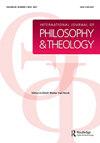Space, time, and the formation of love: the Augustinian self revisited
IF 0.3
0 PHILOSOPHY
International Journal of Philosophy and Theology
Pub Date : 2021-05-27
DOI:10.1080/21692327.2021.1994447
引用次数: 0
Abstract
ABSTRACT This article takes up questions regarding the interrelation of the given and the undetermined in Augustine’s understanding of the self. As a critical point, it argues that debate regarding the Augustinian self has been marked by an emphasis on given structures that has constricted conceptions of human becoming. This emphasis emerges by way of competing narratives of discovery: Augustine is presented as a discoverer either of a constitutive space of the self, or of a determinative temporality. It results in accounts of formation that occlude the spiritual significance of the full sweep of Christ’s history, from incarnation through ascension. As a constructive point, this article argues that Augustine positions himself to develop a Christological vision of Christian becoming, rooted in attention to all aspects of Christ’s life and work, by understanding space and time not as structures that fix the bounds of human becoming, but rather as realities that take on different forms in accordance with differing modes of love.空间,时间,和爱的形成:奥古斯丁自我重访
摘要:本文探讨了奥古斯丁对自我的理解中关于给定和不确定的相互关系的问题。作为一个关键点,它认为关于奥古斯丁自我的辩论的特点是强调特定的结构,这些结构限制了人类成为的概念。这种强调是通过相互竞争的发现叙事出现的:奥古斯丁被呈现为自我构成空间或决定性时间性的发现者。它导致了对形成的描述,掩盖了从化身到提升的整个基督历史的精神意义。作为一个建设性的观点,本文认为,奥古斯丁将自己定位为发展基督徒成为的基督主义愿景,植根于对基督生活和工作的各个方面的关注,通过将空间和时间理解为根据不同的爱模式呈现不同形式的现实,而不是固定人类成为的界限的结构。
本文章由计算机程序翻译,如有差异,请以英文原文为准。
求助全文
约1分钟内获得全文
求助全文
来源期刊

International Journal of Philosophy and Theology
PHILOSOPHY-
CiteScore
0.30
自引率
0.00%
发文量
12
期刊介绍:
International Journal of Philosophy and Theology publishes scholarly articles and reviews that concern the intersection between philosophy and theology. It aims to stimulate the creative discussion between various traditions, for example the analytical and the continental traditions. Articles should exhibit high-level scholarship but should be readable for those coming from other philosophical traditions. Fields of interest are: philosophy, especially philosophy of religion, metaphysics, and philosophical ethics, and systematic theology, for example fundamental theology, dogmatic and moral theology. Contributions focusing on the history of these disciplines are also welcome, especially when they are relevant to contemporary discussions.
 求助内容:
求助内容: 应助结果提醒方式:
应助结果提醒方式:


